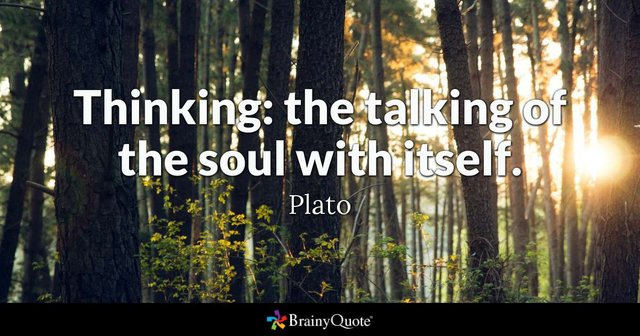
Hi Everyone (December, 2009)
This is the latest Plato introduction - based on two principles for writing on the internet - truth and simplicity!
Read the Plato quotes - Plato was brilliant, astute, charming, amusing, profound, practical, sensible, logical, enquiring, seeking, exploring by considering the simple and obvious.
A wonderful mind!
He also had a good understanding of human nature and our tendency for tribal belief in customs. Both Socrates and Plato knew that a good society must be founded on wisdom derived from truth and reality.
So read one of the greatest minds in human history, wisdom that directly applies to improving ourselves & our society.
Geoff Haselhurst.

Plato Quotes on Philosophy Truth and Reality
And isn't it a bad thing to be deceived about the truth, and a good thing to know what the truth is? For I assume that by knowing the truth you mean knowing things as they really are. (Plato)
The philosopher is in love with truth, that is, not with the changing world of sensation, which is the object of opinion, but with the unchanging reality which is the object of knowledge. (Plato)
Truthfulness. He will never willingly tolerate an untruth, but will hate it as much as he loves truth. ... And is there anything more closely connected with wisdom than truth? (Plato)
What is at issue is the conversion of the mind from the twilight of error to the truth, that climb up into the real world which we shall call true philosophy. (Plato)
The object of knowledge is what exists and its function to know about reality. (Plato)
One trait in the philosopher's character we can assume is his love of the knowledge that reveals eternal reality, the realm unaffected by change and decay. He is in love with the whole of that reality, and will not willingly be deprived even of the most insignificant fragment of it - just like the lovers and men of ambition we described earlier on. (Plato)
Plato Quotes on the Understanding of New Ideas
We are like people looking for something they have in their hands all the time; we're looking in all directions except at the thing we want, which is probably why we haven't found it.(Plato, 380BC)
'That is the story. Do you think there is any way of making them believe it?'
' Not in the first generation', he said, 'but you might succeed with the second and later generations.' (Plato, 380BC)
'We will ask the critics to be serious for once, and remind them that it was not so long ago that the Greeks thought - as most of the barbarians still think - that it was shocking and ridiculous for men to be seen naked. When the Cretans, and later the Spartans, first began to take exercise naked, wasn't there plenty of material for the wit of the comedians of the day?'
'There was indeed'
'But when experience showed them that it was better to strip than wrap themselves up, what reason had proved best ceased to look absurd to the eye. Which shows how idle it is to think anything ridiculous except what is wrong.'
Plato on Truth and Reality
And isn't it a bad thing to be deceived about the truth, and a good thing to know what the truth is? For I assume that by knowing the truth you mean knowing things as they really are. (Plato, 380BC)
The philosopher is in love with truth, that is, not with the changing world of sensation, which is the object of opinion, but with the unchanging reality which is the object of knowledge. (Plato, 380BC)
Truthfulness. He will never willingly tolerate an untruth, but will hate it as much as he loves truth... And is there anything more closely connected with wisdom than truth? (Plato, 380BC)
Then may we not fairly plead in reply that our true lover of knowledge naturally strives for truth, and is not content with common opinion, but soars with undimmed and unwearied passion till he grasps the essential nature of things with the mental faculty fitted to do so, that is, with the faculty which is akin to reality, and which approaches and unites with it, and begets intelligence and truth as children, and is only released from travail when it has thus reached knowledge and true life and satisfaction? (Plato, 380BC)
What is at issue is the conversion of the mind from the twilight of error to the truth, that climb up into the real world which we shall call true philosophy. (Plato, 380BC)
The object of knowledge is what exists and its function to know about reality. (Plato, 380BC)
And those whose hearts are fixed on Reality itself deserve the title of Philosophers. (Plato, 380BC)
When the mind's eye rests on objects illuminated by truth and reality, it understands and comprehends them, and functions intelligently; but when it turns to the twilight world of change and decay, it can only form opinions, its vision is confused and its beliefs shifting, and it seems to lack intelligence. (Plato, 380BC)
'But surely "blind" is just how you would describe men who have no true knowledge of reality, and no clear standard in their mind to refer to, as a painter refers to his model, and which they can study closely before they start laying down rules about what is fair or right or good where they are needed, or maintaining, as Guardians, any rules that already exist.'
'Yes, blind is just about what they are' (Plato, 380BC)
One trait in the philosopher's character we can assume is his love of the knowledge that reveals eternal reality, the realm unaffected by change and decay. He is in love with the whole of that reality, and will not willingly be deprived even of the most insignificant fragment of it - just like the lovers and men of ambition we described earlier on. (Plato, 380BC)